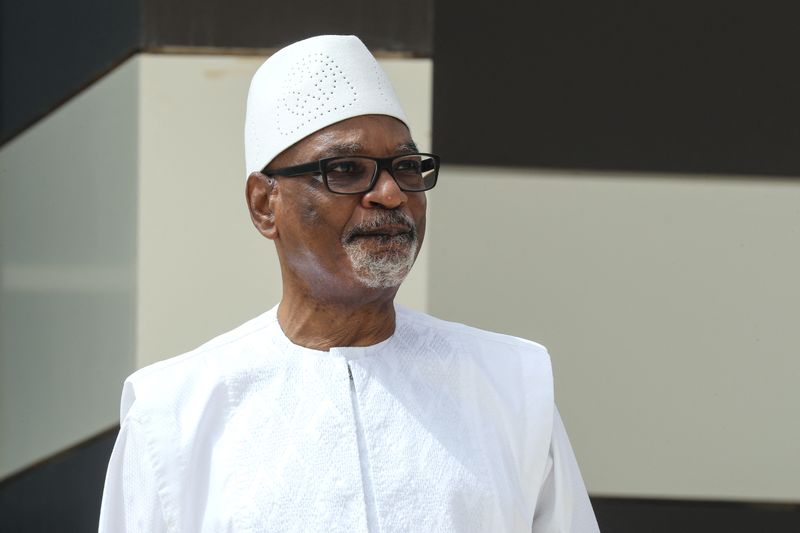By Tiemoko Diallo
BAMAKO (Reuters) -Former Malian president Ibrahim Boubacar Keita, who was ousted by the military in 2020 after a turbulent seven-year rule, has died, officials said on Sunday. He was 76.
Known by his initials IBK, Keita ran the West African country from September 2013 until August 2020, during which Islamist insurgents overran large areas and ethnic violence flared.
Disputed legislative elections, rumours of corruption and low economic growth also fuelled public anger and drew tens of thousands onto the streets of the capital Bamako in 2020 to demand his resignation.
He was eventually forced out by a military coup, whose leaders remain in charge despite strong international objections.
The interim government issued a statement on Sunday that read: "The government of Mali and the Malian people salute the memory of the illustrious deceased."
Leaders from the region including Senegalese President Macky Sall and Burkina Faso's president, Roch Kabore, sent condolences.
The cause of death was not immediately clear. A former adviser said Keita, who frequently travelled abroad for medical attention, had died at home in Bamako.
He was detained and put under house arrest during the coup, but those restrictions were lifted amid pressure from the West African political bloc ECOWAS.
Known for his white flowing robes and a tendency to slur his words, Keita came to power in a resounding election victory in 2013. He vowed to take on the corruption that had eroded support for his predecessor Amadou Toumani Toure, also toppled in a coup.
INSECURITY AND CORRUPTION
Keita had a reputation for firmness forged when he was prime minister in the 1990s, when he took a hard line with striking trade unions.
As president, he enjoyed strong international support, especially from former colonial ruler France, which poured in money and troops to counter al Qaeda-linked jihadists who in 2012 hijacked an ethnic Tuareg rebellion and swept across the desert north.
But continued insecurity ultimately marred his presidency.
French forces pushed back the insurgents in 2013. But they recovered, and have since killed hundreds of soldiers and civilians, driven out local leaders and in some areas set up their own systems of government.
The jihadist attacks also stoked ethnic violence between rival herding and farming communities, which claimed hundreds more lives and underscored the government's lack of control. Abuses by the army bred more resentment, rights groups say.
Keita was also dogged by allegations of corruption.
In 2014, the World Bank and International Monetary Fund froze nearly $70 million in financing after the IMF expressed concern over the purchase of a $40 million presidential jet and the transparency of Mali's defence spending.
When word got out in 2020 that Keita had been toppled, thousands celebrated on the streets.
With promises to end nepotism and corruption, the military struck a chord with millions of impoverished Malians who wanted a break from the past.

On Friday, 18 months on, thousands demonstrated in Bamako against strict sanctions imposed by ECOWAS on the transitional government for trying to extend its hold on power.
"IBK was a man who loved his country," said a woman who came to Keita's house on Sunday to pay her respects. "A good man who never betrayed Mali and who did everything so it did not fall."